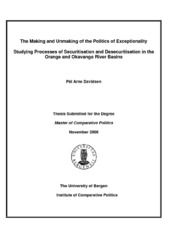| dc.description.abstract | This study acknowledges the shortcomings of, on the one side, keeping the concept ofsecurity in international relations limited and confined to state protection by military meansfrom perceived internal and/or external threats and, on the other side, widening andbroadening the concept of security to encompass all aspects of social life perceived to threatena specific referent objects of security. By drawing upon the work of the Copenhagen Schoolof International Relations (CoS), the study develops a comprehensive framework whichexamines how securitising actors discursively attempt to construct certain state of affairs ordevelopments as threatening to specific referent objects of security. By also paying attentionto the concept of desecuritisation, how to unmake security, which has received scant attentionby the Copenhagen School, the thesis delineates the complex dynamics between securitisationand desecuritisation in the context of perceived water scarcity in two international river basinsin Southern Africa, the Orange and the Okavango. It is argued that the foundation of theinteraction between securitisation and desecuritisation is much dependent on the differentways in which nature has been constructed; the Orange River has become a symbol of“Humankind’s conquest of nature” while the Okavango has been constructed as “God’s gift tohumankind”. Drawing upon the discourse theoretical framework of Ernesto Laclau andChantal Mouffe, it is argued that when enacted through the logic of equivalence, securitisationinvokes a Schmittian understanding of the political which reduces social antagonisms betweenstakeholders in the river basins to a dichotomy between friend and enemy. It is further arguedthat where attempts of desecuritisation take place, these have the potential of creating a morecooperative climate between the respective stakeholders in the basin states. However, byemploying the logic of difference most of these cooperative endeavours are identified ascarrying important and unattended side effects, leaving central, contentious issues aside,ultimately making desecuritisation appear in a bleaker light in the Orange and OkavangoRiver Basins. | en_US |
